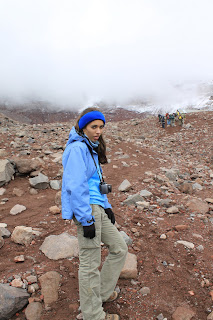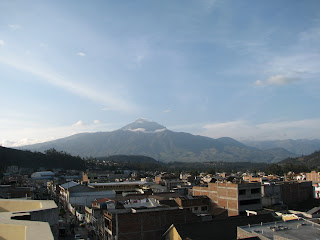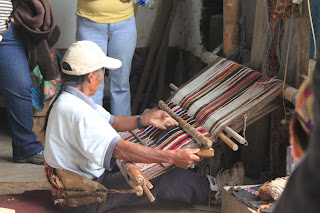
Sometimes I forget that I've been gone from Ecuador two full years, 730 days, approximately 17520 hours. But who's counting?
I was right: Ecuador burrows deep into your skin and wedges itself permanently in your soul. It has a piece of my heart and probably always will.
Two years later, I'm able to see the downfalls of the country: the unstable politics, its socioeconomic status, its need for social reform. But I also see its surreal beauty--always its beauty. It's still the most magical, wonderful, gut-wrenchingly beautiful place I've ever seen.
I was blessed with the opportunity to visit England and Ireland this year (no, the wunderlust hasn't subsided--I doubt if it ever will) but didn't find the connection I had with Ecuador. Was it amazing? Yes. Was it awe-inspiring? Yes. But it wasn't alive like Ecuador. It didn't breathe passion and mystery and raw splendor like Ecuador.
Sometimes, I think people become frustrated with my many references to Ecuador. Fortunately, I lived with three of my travel buddies last year and have remained close with many of my classmates from the Seminar, so there is never a shortage of people to muse about its draw.
Antonia is engaged to an Ecuadorian. Ashley and Katy are teaching in Spain. Nate is in Argentina. Emily is in Washington. Caitlin is in Georgia. Jenny is getting her PhD. Some of us are finishing degrees, some of us are in the real world, some of us are trying explore the wide world as much as possible. None of us are in the same place anymore. Sometimes that's sad to me. I remember the magical nights sleeping under the stars, or talking by candle light, or dancing to some reggaeton until the sun literally came up, or getting deliciously lost in some corner of Cuenca.
Wasn't it just yesterday that I took the house keys from around my neck and gave them back to Mama Isa? They lay on the table between us, my constant companions, a sure sign that this wasn't going to be my home for much longer.
Sometimes it feels like a dream, slipping away even though I desperately try to hold on to it as I wake up. There are so many things I miss Mama Isa and hot bread and... well, you know. Sometimes I want that back so bad it physically hurts, like my breath is being drawn from my chest. I dream about it--often in Spanish, though more and more in my dreams, I am often struggling to find the right words to speak with my host mom.
I was able to channel my energy into working at the Study Abroad office at school. That way I could talk about my experiences AND get paid! I pushed the Seminar in Ecuador '11 trip hard--marketing, speaking to potential students, talking to them in order prepare them for the wonder that is South America's gem. I sincerely hope they had an experience like our group did.
Things that this trip gave me:
-Self-Confidence and "Chillness":
I was very shy the first year of college. I didn't talk to many people. I wasn't involved in any extra-curricular activities. I did A+ work and saw that as my number 1 goal in life. I was highly anxious about getting that letter grade and developed an anxiety disorder. Ecuador was going to challenge me in ways I couldn't anticipate for. Traveling is always done by the skin of your teeth, to some extent. You'll never be able to prepare for it 100%. I realized that I didn't need to depend on my parents and my best friends at home to help me through tough times. I made decisions--and mistakes--entirely on my own and realized that I was actually capable of taking care of myself! I also took a B on my final Spanish grade, largely due to the last-minute trip to the coast. That was okay. Experiencing the country was a genuine learning experience, not the studying which would yield an A. My anxiety lessened drastically after the trip and I was able to tackle it! I'm more active in school, am far more outgoing, and am not afraid to try new things!
-A Broader Understanding of My Place in the World:
What do you know? I'm not the center of the universe! Americans aren't even the top of the food chain! I'm only a wee molecule of what makes the earth go around. Seeing people of all sorts of socioeconomic stratifications made me realize just how fortunate I was to have food on my plate, a roof over my head, and a great education. When I got back, Fair Trade became a passion so people in other countries weren't exploited for their resources and work.
-The Knowledge that I Can Rough It:
No electricity? No meat? No hot water? No car? No cell phone? No internet? I can deal with that! I'm a lot more capable than I ever thought! I loved living three months without first-world conveniences.
-Life-Long Friendships:
I lived with three of my best friends from the trip and saw many of the other people I'd gotten close with regularly. I won't speak to all of the trip participants for the rest of my life, but there were some real gems I know I want in my life forever.
-An Appreciation for My Family:
They supported me through this adventure, listened to me cry when I was homesick for a country I wasn't born in, and looked at ALL of my pictures (all 5,000 of them!).
(written a year after we returned)
Nate's in the center inventing dance moves to house music. Adam's in the corner taking pictures. Shannon's dancing like no one is watching. Natalie is taking a page from the "Peanuts" gang dance, shrugging her shoulders to the beat. Everyone is touching, sweating, teasing, laughing, being, loving.
Barely any of us are part of the same social cliques. Some of us are extraordinarily privileged and others are taking out loans as fast as possible. There are Biology majors, Sociology majors, Psychology majors, Spanish majors, English majors, Computer Science majors, graduates. There are Buddhists, Protestants, Atheists, Agnostics, Apathetics. There are timids, boisterouses, awkwards, barbies, comics, braves, sympathics. Nothing predicts what happens when we are together because it defies all logic.
Maybe it's because we were thrown into classes together every day for 4 months, or because we spent 3 months as aliens in a foreign country. Or because we spent 6 hours riding on buses through vomit-inducing mountain rides and 10 hour boat/chiva/canoe/bus trips and 10 hour flights and 8 kilometer hikes in misery together. Or because we got called "baby shampoo," "white b*tch," "sexy," "princessa," "bonita," every day.Or because we experienced panic attacks, screaming, crying, homesickness, anger, hope, happiness, frustration, joy, wonder, and love together. Or because we had dirty hair and 3-day-old sweat stains on our clothes. Or because we stared in wonder at the same world around us.









































